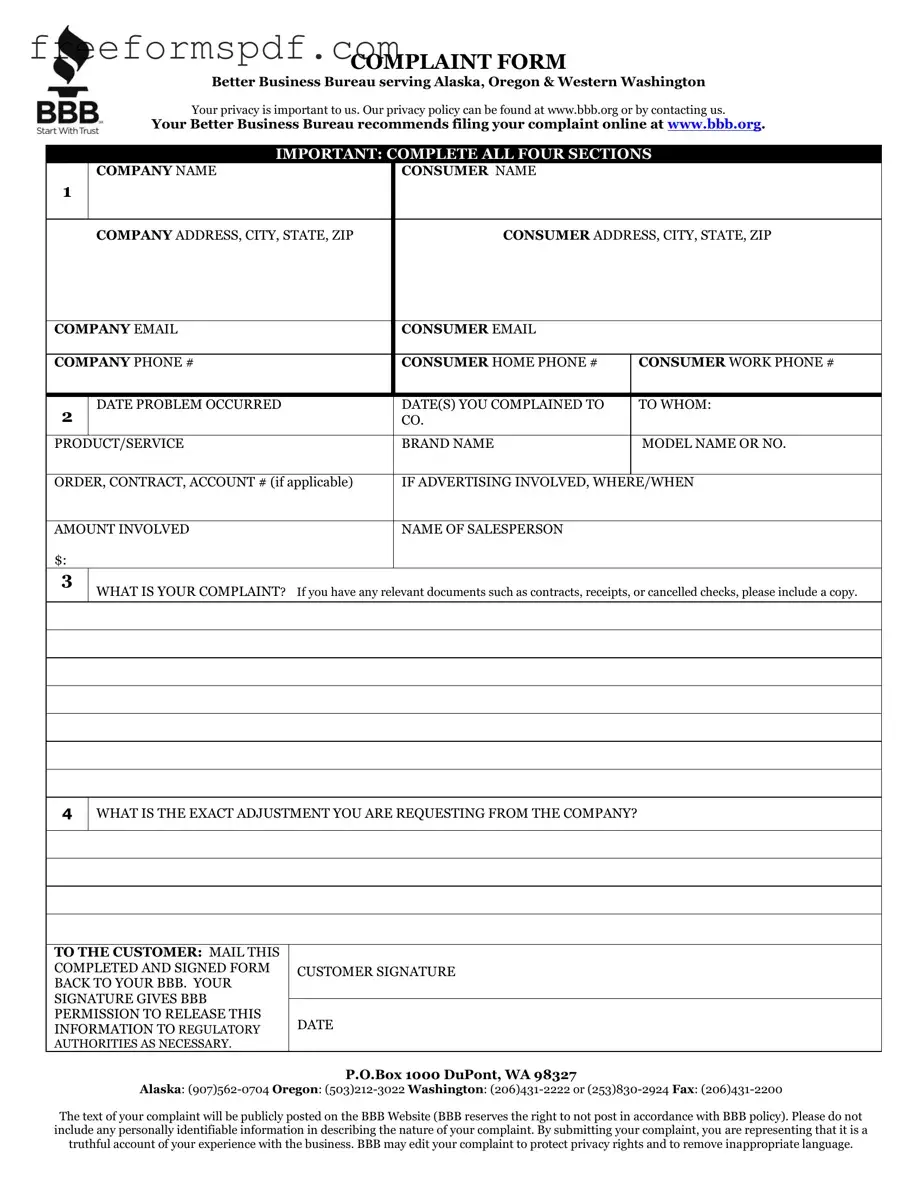Fill in a Valid Bbb Complaint Template
Common mistakes
-
Insufficient Details: Many individuals fail to provide enough information about their complaint. A vague description can lead to delays in processing. It is essential to include specific details about the transaction, such as dates, amounts, and the nature of the issue.
-
Not Including Supporting Documentation: Complaints that lack supporting documents are often less persuasive. Attach receipts, emails, or any relevant correspondence. This evidence can strengthen the case and provide clarity to the complaint.
-
Ignoring the BBB's Guidelines: Each complaint form has specific instructions. Failing to follow these guidelines can result in the complaint being dismissed. Read the instructions carefully to ensure all required fields are completed accurately.
-
Neglecting to Follow Up: After submitting a complaint, some individuals do not check for updates. Following up can help keep the complaint active and ensure that any additional information requested is provided promptly.
Learn More on This Form
-
What is the BBB Complaint Form?
The BBB Complaint Form is a tool provided by the Better Business Bureau (BBB) that allows consumers to report issues they have experienced with businesses. This form helps facilitate communication between consumers and businesses, encouraging resolutions to disputes.
-
Who can file a complaint using the BBB Complaint Form?
Any consumer who has had a negative experience with a business can file a complaint. This includes individuals who have purchased products or services and feel that the business has not met their expectations or has acted unethically.
-
How do I access the BBB Complaint Form?
The BBB Complaint Form can be accessed online through the official BBB website. Navigate to the "File a Complaint" section, where you will find the form available for completion. It can also be submitted via mail or in person at local BBB offices, depending on your preference.
-
What information do I need to provide when filing a complaint?
When filling out the complaint form, you will need to provide your contact information, details about the business in question, and a clear description of your complaint. It’s important to include any relevant documentation, such as receipts or correspondence, to support your case.
-
What happens after I submit my complaint?
Once your complaint is submitted, the BBB will review it and forward it to the business involved. The business will then have the opportunity to respond. You will receive updates on the status of your complaint, and the BBB may facilitate communication between you and the business to help resolve the issue.
-
Is there a fee to file a complaint?
No, there is no fee associated with filing a complaint using the BBB Complaint Form. This service is provided free of charge to consumers as part of the BBB’s mission to promote trust in the marketplace.
-
Can I remain anonymous when filing a complaint?
While you can choose not to provide your name when submitting a complaint, it is generally recommended to include your contact information. This allows the BBB and the business to reach out for further clarification or to resolve the issue more effectively.
-
What if my complaint is not resolved?
If your complaint remains unresolved after the BBB's intervention, you may consider other options. These can include filing a complaint with a government agency, seeking legal advice, or exploring alternative dispute resolution methods such as mediation or arbitration.
Misconceptions
When it comes to the BBB Complaint form, there are several misconceptions that can lead to confusion. Here’s a breakdown of eight common misunderstandings:
- Filing a complaint guarantees a resolution. Many believe that submitting a complaint will automatically lead to a satisfactory outcome. In reality, while the BBB facilitates communication, it does not guarantee a resolution.
- The BBB is a government agency. Some people think the BBB operates under government authority. However, it is a private, nonprofit organization that helps resolve disputes between consumers and businesses.
- All complaints are made public. There is a belief that every complaint filed is visible to the public. In fact, the BBB may keep certain complaints confidential to protect sensitive information.
- You must be a member to file a complaint. Many assume that only customers of BBB-accredited businesses can file complaints. In truth, anyone can submit a complaint against any business, regardless of its BBB status.
- The BBB resolves all complaints quickly. There is a misconception that the process is swift. The resolution timeline can vary significantly based on the complexity of the issue and the responsiveness of the business involved.
- Filing a complaint will harm the business. Some worry that submitting a complaint will negatively impact the business permanently. While it may affect the business's BBB rating, it is intended as a constructive process to encourage resolution.
- You can only file complaints online. Many think that online submission is the only option. The BBB also accepts complaints via phone and mail, providing multiple avenues for consumers.
- The BBB can take legal action on your behalf. Some individuals believe that the BBB has the power to pursue legal action. However, the BBB’s role is to mediate disputes, not to act as a legal representative for consumers.
Understanding these misconceptions can help consumers navigate the complaint process more effectively. Being informed leads to better outcomes.
Browse More Forms
Best Free Invoice Maker - Streamline your payment requests with this convenient form.
For those seeking to safeguard their interests, understanding the importance of a Non-disclosure Agreement in a professional setting is crucial. This type of contract is pivotal in maintaining the confidentiality of sensitive conversations, ensuring that proprietary information remains secure. More information about this legal document can be found within the context of a professional Non-disclosure Agreement.
Blank Bill of Lading - In some cases, the Straight Bill of Lading may be required for regulatory inspections.
